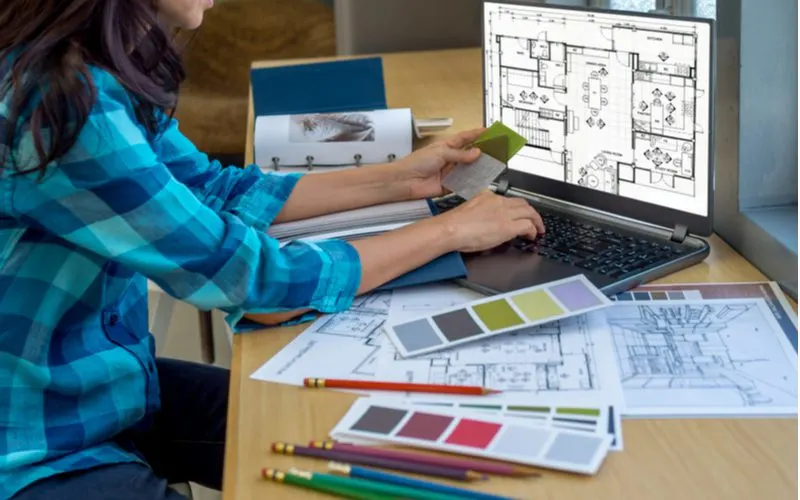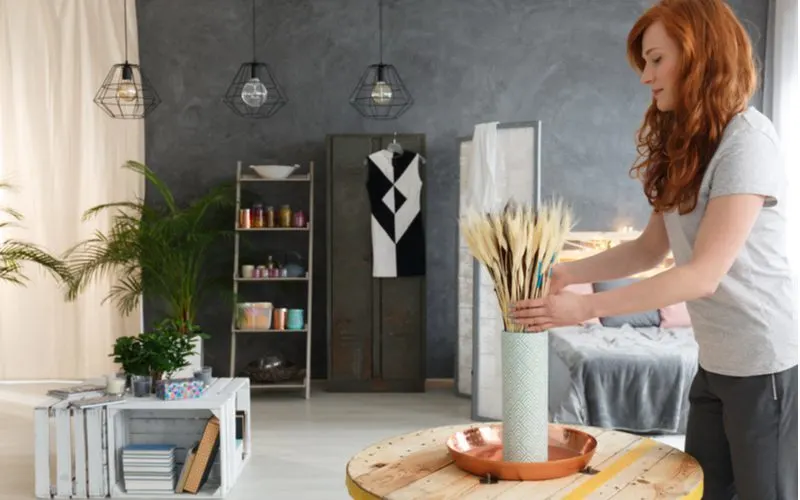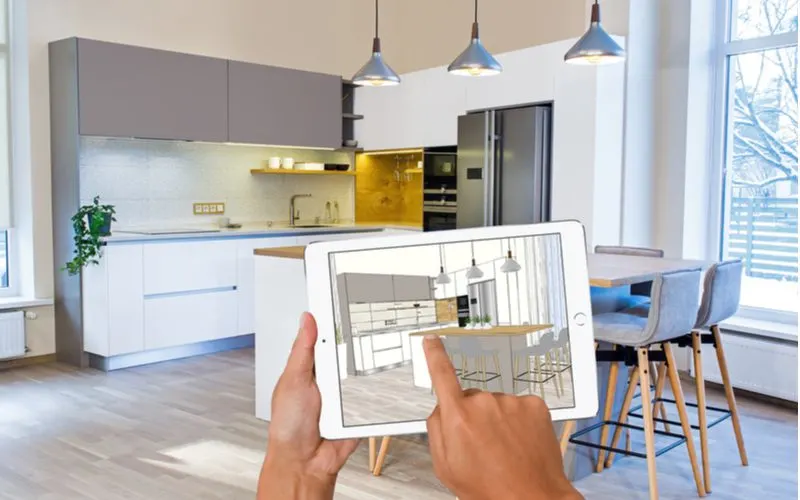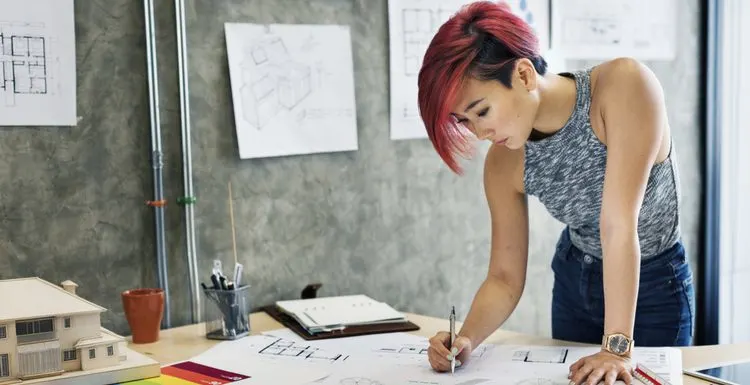Ah, the great debate rages on: interior design vs. interior decorating. Yes, there is definitely a difference.
To squash any ongoing debate, we’ve set out to explain the differences once and for all. Read on to learn more.
Interior Design vs Interior Decorating
- Interior Designer: designs interior spaces, meaning they may or may not play a role in decorating a given work or living space.
- Interior Decorator: Rarely plays any role in the overall design of the actual space and instead simply picks out the decorations.
The Basic Differences
An interior designer can be great at interior decorating but doesn’t have to be. An interior decorator can be great at interior design, but unless they are licensed to work without direct supervision in commercial spaces, they cannot claim the mantle of interior designer.
Interior Design

Naphat_Jorjee/Shutterstock
An interior designer is often licensed and trained in interior design concepts. In many cases, an interior designer will have a bachelor’s degree, usually in interior design or architecture.
The typical interior designer will focus on the functional spaces of a building and how each space should be arranged for:
- Maximum efficiency
- Productivity
- Health
- Enjoyment
This entails researching an organization or the desires of a homeowner and methodically analyzing their needs before designing a space that meets those objectives through interior design concepts.
For example, a lot of research has been done on how the layout of an office building affects productivity. An interior designer will take that research and design a space that capitalizes on the findings.
That might mean including brighter spaces or windows, nap pods, standing desks, collaborative workspaces, or a cafeteria that can double as a rec room when needed.
In a home, an interior designer might:
- Utilize lighting to maximize the warmth of a room
- Choose furniture for a room or rooms that project the goals of the client
- Create nooks within the existing design for specific activities such as reading, conducting research, napping, etc.
- Incorporate room flow ideas so that each room works with all the others to create a sense of seamlessness
- Replace cabinets and countertops in a kitchen or re-design the overall structure of a bathroom
The goal of an interior designer is to merge the client’s needs and desires with design concepts that meet productivity, attractiveness, efficiency, and enjoyment criteria.
Interior Decorating

Photographee.eu/Shutterstock
Interior decorating is exactly as the name indicates. A decorator is responsible for incorporating functional and attractive furniture, color schemes, and features to make a living space as comfortable and aesthetically pleasing as possible.
In terms of schooling, interior decoration doesn’t have specific criteria, but a background in art or another creative field is common. Whereas a designer will focus on principles of construction or renovation, a decorator will rely on their own instincts and sense of décor and fashion.
There are also many classes available for an interior decorator looking to expand their horizons. These are offered by local adult learning organizations or by vendors that make specific products.
A flooring company, for instance, may hold training in how to match their products with counters and cabinets. A paint supplier may have training classes on how to mix and match their colors in the most effective ways possible.
Decorators do not meet with contractors or architects. They will, however, meet with interior designers if necessary, as well as both office managers and homeowners.
The purpose of any meeting is to define décor goals so the decorator can create a space that captures those objectives.
There Are Similarities
Interior design and interior decorating are fundamentally different, but that doesn’t mean each is mutually exclusive.
Both an interior designer and interior decorator can weigh in on an aspect of a building’s aesthetic or collaborate on a job.
Each, however, serves its own role in the process of making or remaking a work or living space.
- The interior designer, for example, might coordinate with an interior decorator in the design of a new home’s architectural layout. They also might collaborate on flow and light issues, like window and door placement.
- An interior decorator will initiate a meeting with a designer on new construction when they want to get a sense of what the designer has in mind. If the designer is planning on an extremely open concept series of “rooms,” the decorator can ensure the furniture and look of the room flow together.
Another similarity is that they each must have a sense of décor and style. A designer who is purely functional will likely design a workspace or home that is so routine it is boring. A decorator with no decorating skills will likely have some very unhappy clients.
FAQs
What are the differences between an interior designer and an interior decorator?
The key differences between an interior designer and a decorator are purpose and education. While a designer focuses on design concepts, a decorator focuses on aesthetics.
Both can play major roles in designing and putting together a work or living space that meets all your goals. Coordination between the two, however, is not necessary to be able to complete a project.
The typical designer will work with a contractor to create an internal space that compliments the client’s goals. A decorator will work with an office or project manager, business, or homeowner and take that space and make it look as attractive as possible.
What are the educational requirements for interior designers and decorators?
Interior designers typically have a Bachelor’s degree, and it usually is in some field related to designing spaces. That could be an actual interior design degree or something related to architecture. An interior decorator might have a degree, but it isn’t a requirement.
They can take training, usually via adult learning classes or from product vendors. The key to being a good decorator is having a sense of taste, aesthetics, and décor as well as being able to merge them and make them all work together.
What are fundamental interior design concepts?
Interior design includes seamlessly merging the functionality of a space with attractiveness, ease of use, and productivity. Customers may also want an interior designer to come up with design ideas that focus on a calming environment.
What are fundamental interior decoration concepts?
Good interior decorators will take a client’s vision for their work or living space and come up with decorating ideas that attain those goals.
This includes creating paint schemes and selecting furniture, equipment, and other features of an office or home that work together seamlessly to create a very livable space.
How do I find a designer or decorator?
The easiest way is to talk to a contractor and a realtor. Both can usually recommend who they work with. If they cannot come up with a name, they usually can recommend a contact for you that can.
Do designers and decorators work together?
Not often, but if the client has a very detailed set of objectives that require design and decoration to work together, they might. For example, a designer might work with a decorator to help put together a high-end boutique or an as-yet-to-be constructed home.
Generally, the decorator is seen as important but not required. The designer is seen as fundamental to ensure a sound design of the workspace, building, or home.
Interior Design vs. Interior Decorating: Who Wins?

Richard Salamander/Shutterstock
Interior designers and interior decorators differ in the education that is required to do each job and the purpose of each within the context of a building, office, or home.
Both are vital to creating an aesthetically pleasing, seamlessly flowing living space and workspace.

